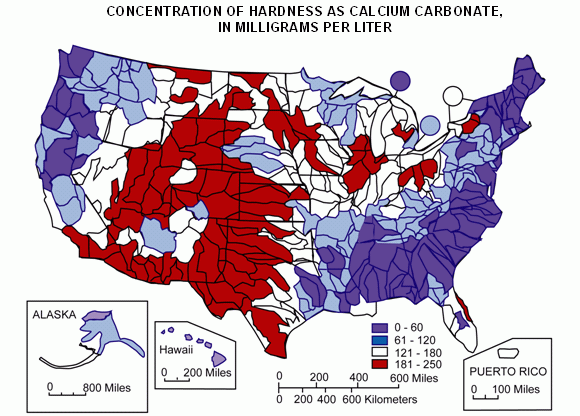Authority: Up to 15,000 Allentown water lines may be lead
Source: AP via Philadelphia Inquirer
The head of a county water authority says as many as 15,000 water lines serving homes in one eastern Pennsylvania city might be made of lead. WFMZ-TV says Wednesday night's comment by Liesel Gross of the Lehigh County Authority comes weeks after tests showed more children in Allentown have dangerously high levels of lead in their blood than children in any other Pennsylvania city. <snip>
The authority took control of Allentown's water system three years ago. Officials say there are at least 5,000 service lines made of lead and as many as 15,000.
It would cost about $1,500 to replace each lead line, or up to $23 million.
Read more: http://www.philly.com/philly/news/20160414_ap_816a62f1bd9a48f3b28d0358488cd3d7.html
Between 5,000 and 15,000 service lines -- just try counting to 15,000, not to mention the time it would take replacing them.
Terrible, terrible for Allentown, Pennsylvania residents.
Sunlei
(22,651 posts)replacement/repair. Sometime those who profit off sales and rents have to pay to repair things.
Orrex
(63,221 posts)I imagine that I'm chock full o' lead, in that case.
bigworld
(1,807 posts)There's really no need to rip them all up.
I was skeptical of your point that lead water pipes are safe, so I did a little research online at sources such as the CDC (Centers for Disease Control and Prevention). I'm not seeing any authorities who say that "properly maintained" lead pipes are safe for carrying drinking water.
bigworld
(1,807 posts)I'm just saying even though many cities have lead pipes, it doesn't mean lead is necessarily leaching into the water supply if they are properly monitored and maintained.
Flint failed because they forgot to add a simple anti-corrosive chemical, and the acidic river water ate away at the pipes, releasing the lead into the drinking water.
Here's a quick takeaway from this chemical overview:
----------
This isn’t usually an issue because in areas where lead pipes are present, corrosion inhibitors can be used to prevent the lead getting into the water. A common corrosion inhibitor is orthophosphate; this is simply phosphoric acid, or salts of phosphoric acid. Orthophosphates form low-solubility complexes with the lead in the pipes, forming a layer inside the pipe and preventing lead getting into the water. These compounds were used in the Detroit water supply before the switch, even though the water had a comparatively low corrosiveness.
------
Of course the pipes should all replaced eventually -- the risk is too great. But if you have lead pipes in your city, it doesn't automatically mean you're drinking it.
Old Crow
(2,212 posts)happyslug
(14,779 posts)Most of the water in the US is "Hard Water". "Hard Water" is known to leave a coating on the inside or pipes.
https://en.wikipedia.org/wiki/Hard_water

http://water.usgs.gov/owq/hardness-alkalinity.html
A better map:

https://akwamag.com/areas-most-affected-by-hard-water/
Thus in hard water areas, as water flows through pipes, a mineral buildup occurs inside those pipes. This deposit prevents any interaction between the material in the pipe and the water (The Ancient Romans also had hard water, thus the use of lead pipes had no affect on the Ancient Romans, the stories you hear of the lead affecting the Romans go back only to 19th century Britain),
It was the high acid content of the water attacking those mineral deposits, thus exposing the water to the lead in the lead pipes that was the problem.
Here is a photo of an ancient Roman Pipe that is known to have water flowing through it for 180 years, it had 20 cm (about 8 inches) of mineral build up.

pengu
(462 posts)"tests showed more children in Allentown have dangerously high levels of lead in their blood than children in any other Pennsylvania city."
Gregorian
(23,867 posts)There are a lot of old mysteries under our land. Some poisonous.
I often wonder about the dumps around the Bay Area where every imaginable chemical was just pushed down into the mud with bulldozers. Paint cans, pharmaceuticals, garbage from a hundred years or more. That stuff is still under the ground, and right in the bay. We're living a modern lifestyle, which is poisoning our nest. But it's convenient.
happyslug
(14,779 posts)Wood is a very good pipe material, if it stays WET. The water in the wood expands the wood and prevents any leaks. The Wood pipelines in Johnstown are about 150 years old, installed in the late 1800s.
tabasco
(22,974 posts)The U.S. needs a new aircraft carrier.
